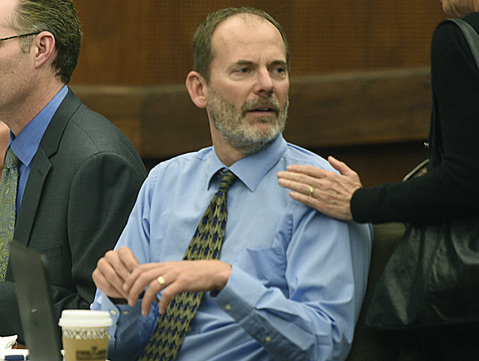Coastal Commission Fires Executive Director
Commissioners Say Charles Lester Was Often Unreachable and Withheld Information

By a narrow vote on February 10, the 12-member appointed board of the California Coastal Commission fired Executive Director Charles Lester as hundreds of his supporters staged a vigorous but ultimately futile rally to save him. The hearing, held in Morro Bay, stretched nearly 12 hours, the vast majority of it filled with public testimony praising Lester’s leadership, accomplishments, and institutional memory of the state agency’s four-decade balancing act of protecting the Golden State’s 1,100-mile coast from intense development, keeping its beaches accessible to the public, and respecting the rights of private landholders.
Lester started at the Coastal Commission as an intern out of law school in 1989, moved up the ranks, and worked closely under its first executive director, Peter Douglas. By a unanimous appointment, Lester became executive director in 2011.
With his final remarks before adjournment, Lester thanked the commission “for the honor to have served” before addressing the crowd. “I worked hard, and I accomplished a lot,” he told his supporters, a vast cross section of Californians from Imperial Beach to Humboldt. “If there’s any silver lining … I’m so energized by the people who came together. Thank you.” Lester received a loud and sustained standing ovation.
Leading up to the hearing, commissioners cited Lester’s proposed termination as a personnel matter and would not provide details beyond unspecified leadership concerns and a lack of diversity within the agency. At the hearing, though, detractors explained that they often felt excluded and deprived of pertinent information and at times found inconsistencies in staff reports.
“I do feel that we were not getting what we needed [to do our jobs],” said Commissioner Dayna Bochco, speaking to Lester directly. Bochco was one of five commissioners — along with Steve Kinsey, Mary Shallenberger, Carole Groom, and Mary Luévano — who voted to keep Lester at his post. Voting for his dismissal were Olga Diaz (an alternate for Gregory Cox), Erik Howell, Martha McClure, Wendy Mitchell, Effie Turnbull-Sanders, Roberto Uranga, and Mark Vargas.
Lester’s termination was effective immediately; Senior Deputy Director Jack Ainsworth will lead the agency until the commission selects a replacement.
Opening the meeting, Lester defended his track record and offered a game plan to remedy his perceived weaknesses, including the formation of a subcommittee to increase workforce diversity. Lester’s 11th-hour plea — supported by nearly 30,000 letters, dozens of legislators and former commissioners, and 150 staffers — failed to sway the majority of the commission, which voted privately despite feedback from the agency’s chief legal counsel, Chris Pederson, who said they could deliberate and vote publicly if they wished.
Speaker Ralph Faust — who served as the agency’s chief counsel for more than 20 years and had known Lester since he was an intern — shared that sentiment. “The commissioners should honor the public and the process and the Coastal Act by owning their decision,” he said. “You should state your reasons in open session and take your action in open session. Own it and defend it.”
Instead, most of the commissioners railed against the media, which had for the most part portrayed Lester’s ousting as a power play by developers and energy-industry forces with vested interest in coastal development. Commissioners denied being persuaded by pro-development lobbyists to fire Lester.
That narrative wasn’t lost on lawmakers, however. Earlier this week, Assemblymembers Toni Atkins, Mark Stone, and Marc Levine, joined by coauthor State Senator Hannah-Beth Jackson, announced legislation that would require anybody who lobbies the Coastal Commission to disclose his or her clients and expenditures with the Secretary of State.



